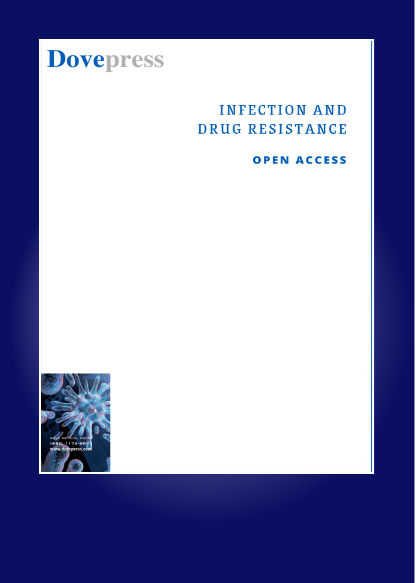COVID-19 索马里摩加迪沙孕妇疫苗接种率及相关因素
IF 2.9
3区 医学
Q2 INFECTIOUS DISEASES
引用次数: 0
摘要
背景:孕妇因担心婴儿接种 COVID-19 疫苗的潜在风险、怀疑疫苗疗效以及获取信息的途径有限而表现出犹豫不决的态度。因此,本研究旨在估算索马里摩加迪沙孕妇对 COVID-19 疫苗的接种率及相关因素:对孕妇进行了一项横断面研究,问卷内容包括社会人口学信息、与怀孕相关的特征、对 COVID-19 疫苗的看法以及疫苗接种情况。利用单变量和多变量逻辑回归分析来确定与结果变量相关的因素:结果:在参与这项研究的 400 名孕妇中,26.8% 的人接种过 COVID-19 疫苗,其中只有 14.9% 的人在怀孕期间接种过。未接种疫苗的原因包括:缺乏有关疫苗的信息(47.4%)、担心疫苗对个人健康产生不良影响(33.8%)、对影响生育或月经周期存在误解(14.3%)、认为疫苗无效(3.4%)以及担心对胎儿产生不良影响。在多变量逻辑回归中,有慢性病史的孕妇(AOR=3.27,95% CI=1.992-6.145)、认为自己有感染 COVID-19 风险的孕妇(AOR=3.81,95% CI=2.11-5.10)、认为自己可以接种疫苗的孕妇(AOR=4.34,95% CI=2.915-6.165)、与医护人员讨论过COVID-19疫苗问题(AOR=3.91,95% CI=2.123-7.878)的孕妇比同龄人更有可能接种COVID-19疫苗:结论:索马里摩加迪沙的孕妇面临着COVID-19疫苗接种率不达标的挑战。实施工作应提高人们对 COVID-19 风险的认识,并促进医疗服务提供者与孕妇之间的讨论。此外,提供有关疫苗的可靠信息、减轻对其不良反应的担忧、消除对生育、月经周期、疗效和胎儿影响的误解也至关重要。本文章由计算机程序翻译,如有差异,请以英文原文为准。
COVID-19 Vaccine Uptake and Factors Associated Among Pregnant Women in Mogadishu, Somalia
Background: Pregnant women exhibit COVID-19 vaccine hesitancy due to concerns regarding potential risks to their babies, doubts about vaccine efficacy, and limited access to information. Therefore, this study aims to estimate COVID-19 vaccine uptake and factors associated with pregnant women in Mogadishu, Somalia.
Methods: A cross-sectional study was conducted on pregnant women using a questionnaire covering socio-demographic information, pregnancy-related characteristics, perceptions about the COVID-19 vaccine, and vaccination status. Univariable and multivariable logistic regression analyses were utilized to identify factors associated with the outcome variable.
Results: Among the 400 pregnant women who participated in this study, 26.8% had received a COVID-19 vaccine dose, with only 14.9% receiving it during pregnancy. Reasons for not receiving the vaccine included a lack of information about the vaccine (47.4%), concerns about its adverse effects on personal health (33.8%), misconceptions regarding impacts on fertility or menstrual cycles (14.3%), belief in the vaccine’s inefficacy (3.4%), and fears about adverse effects on their fetus. In multivariable logistic regression, pregnant women with a history of chronic diseases (AOR=3.27, 95% CI=1.992– 6.145), those who perceived themselves at risk of contracting COVID-19 (AOR=3.81, 95% CI=2.11– 5.10), those who believed that the vaccine was accessible to them (AOR=4.34, 95% CI=2.915– 6.165), and those who discussed the COVID-19 vaccine with their healthcare provider (AOR=3.91, 95% CI=2.123– 7.878) were more likely to receive the COVID-19 vaccine compared to their counterparts.
Conclusion: Pregnant women in Mogadishu, Somalia, face challenges with sub-optimal covid-19 vaccine uptake. Implementations should improve awareness of COVID-19 risks and facilitate discussions between healthcare providers and pregnant women. In addition, efforts to provide reliable information about the vaccine, alleviate concerns about its adverse effects, and dispel misconceptions about fertility, menstrual cycles, efficacy, and foetal impact are crucial.
Methods: A cross-sectional study was conducted on pregnant women using a questionnaire covering socio-demographic information, pregnancy-related characteristics, perceptions about the COVID-19 vaccine, and vaccination status. Univariable and multivariable logistic regression analyses were utilized to identify factors associated with the outcome variable.
Results: Among the 400 pregnant women who participated in this study, 26.8% had received a COVID-19 vaccine dose, with only 14.9% receiving it during pregnancy. Reasons for not receiving the vaccine included a lack of information about the vaccine (47.4%), concerns about its adverse effects on personal health (33.8%), misconceptions regarding impacts on fertility or menstrual cycles (14.3%), belief in the vaccine’s inefficacy (3.4%), and fears about adverse effects on their fetus. In multivariable logistic regression, pregnant women with a history of chronic diseases (AOR=3.27, 95% CI=1.992– 6.145), those who perceived themselves at risk of contracting COVID-19 (AOR=3.81, 95% CI=2.11– 5.10), those who believed that the vaccine was accessible to them (AOR=4.34, 95% CI=2.915– 6.165), and those who discussed the COVID-19 vaccine with their healthcare provider (AOR=3.91, 95% CI=2.123– 7.878) were more likely to receive the COVID-19 vaccine compared to their counterparts.
Conclusion: Pregnant women in Mogadishu, Somalia, face challenges with sub-optimal covid-19 vaccine uptake. Implementations should improve awareness of COVID-19 risks and facilitate discussions between healthcare providers and pregnant women. In addition, efforts to provide reliable information about the vaccine, alleviate concerns about its adverse effects, and dispel misconceptions about fertility, menstrual cycles, efficacy, and foetal impact are crucial.
求助全文
通过发布文献求助,成功后即可免费获取论文全文。
去求助
来源期刊

Infection and Drug Resistance
Medicine-Pharmacology (medical)
CiteScore
5.60
自引率
7.70%
发文量
826
审稿时长
16 weeks
期刊介绍:
About Journal
Editors
Peer Reviewers
Articles
Article Publishing Charges
Aims and Scope
Call For Papers
ISSN: 1178-6973
Editor-in-Chief: Professor Suresh Antony
An international, peer-reviewed, open access journal that focuses on the optimal treatment of infection (bacterial, fungal and viral) and the development and institution of preventative strategies to minimize the development and spread of resistance.
 求助内容:
求助内容: 应助结果提醒方式:
应助结果提醒方式:


